London Police Detains Man Near Iran International Offices
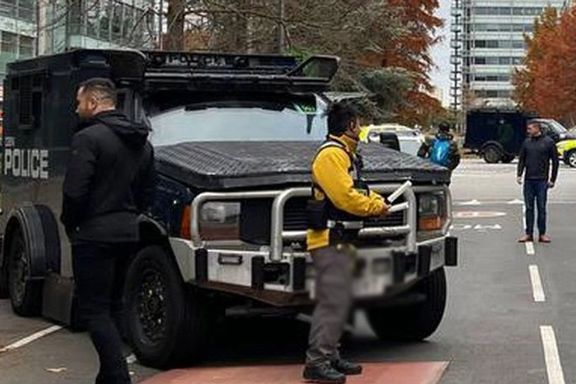
London’s Metropolitan Police detained a man Monday under the Terrorism Act, close to Iran International’s offices, after he was observed acting suspiciously.

London’s Metropolitan Police detained a man Monday under the Terrorism Act, close to Iran International’s offices, after he was observed acting suspiciously.
Details of the incident are not available yet, including if the suspect was linked to any security risk related to Iran International.
In mid-November, Iran International was informed that elements connected to Iran’s intelligence services posed a threat to two of its journalists. A few days later, the police positioned armored vehicles outside the headquarters of the television network in London and other security measures were put in place.
Islamic Republic officials have used threatening language speaking about Iran International, which has been reporting around the clock on the popular protests in Iran since mid-September.
Tehran has accused “enemies” of fomenting the unrest, which began when Mahsa Amini, a 22-year-old woman was killed in police custody. She was arrested for her ‘improper hijab.’
The term ‘enemies’ in the official Iranian jargon usually means the United States, United Kingdom, Israel and Saudi Arabia.
The Islamic Republic has been persecuting journalists for decades, but began a harassment campaign against foreign-based Iranian journalists more than a decade ago, by direct and indirect threats, including against family members still residing in Iran.
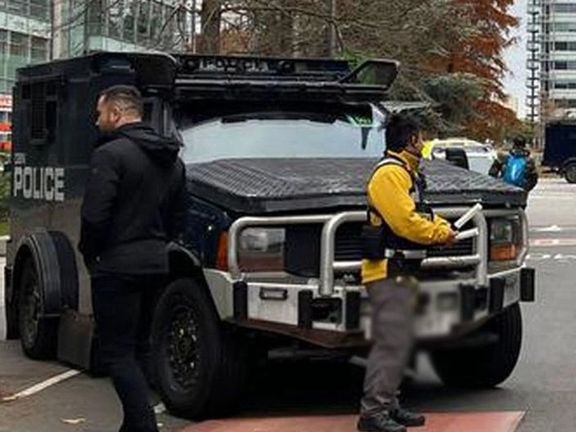
Iran’s Revolutionary Guard arrested seven people Sunday, claiming they had links to Britain, including some dual nationals, over ongoing antigovernment protests.
"Seven main leaders of the recent protests related to the UK were detained by intelligence services of the IRGC including dual nationals who were trying to leave the country," a statement published by state-controlled media read.
The British foreign ministry said it was seeking further information from Iranian authorities on reports that British-Iranian dual nationals had been arrested in Iran.
Britain’s MI5 said on November 16 that UK authorities had discovered at least 10 “potential threats” since January to “kidnap or even kill British or UK-based individuals perceived as enemies of the regime.” London's Metropolitan Police alerted Iran International at the time of imminent danger to two of its journalists.
The protests, in which demonstrators from all walks of life have called for the fall of Iran's ruling theocracy, has posed one of the biggest challenges to the Shi'ite Muslim-ruled Islamic Republic since the 1979 revolution.
Since the protests began the regime has been blaming foreign “enemies” for organizing and instigating the unrest. It has offered no evidence to substantiate its claims. Earlier, the authorities claimed to have arrested nine foreigners in the protests.
So far, security forces have killed more than 500 civilians, arrested around 18,000 people and hanged two protesters after bogus trials.
The Islamic Republic has a long history of detaining foreign and dual nationals on trumped up charges in what amounts hostage taking, to have bargaining chips against Western countries.
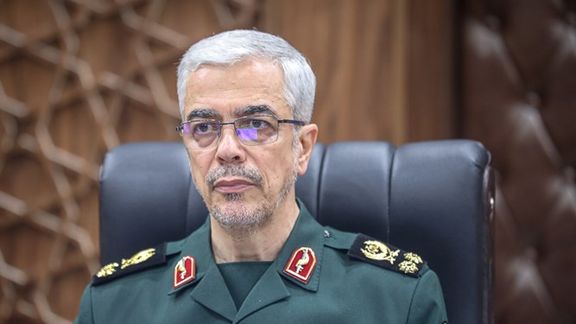
A top Iranian military official says the Islamic Republic will continue to develop drones according to its interests and Tehran will cooperate with other countries in this regard.
According to IRNA, Chief of General Staff of the Iranian Armed Forces Major General Mohammad Bagheri said Sunday that the country’s UAVs are accurate enough to respond to any threat endangering its interests.
This comes as the Biden administration launched a task force last week to see how US and western components are ending up in Iranian drones used in Russia’s war on Ukraine.
Although strict measures were in effect to prevent the Islamic Republic from obtaining such materials, some evidence shows Tehran has more than enough access to US-made microelectronics that are used in manufacturing drones.
Last month, a UK-based investigative organization found that over 80 percent of the drones downed in Ukraine have components made by US companies.
Kyiv has accused Tehran of supplying 1,700 Shahed-136 loitering munitions to Moscow, which it says have been used to hit targets in Ukraine since September. Iran denies the allegations.
The United States and its European allies, as well as the European Union have sanctioned various Iranian individuals and entities for supplying drones to Russia.
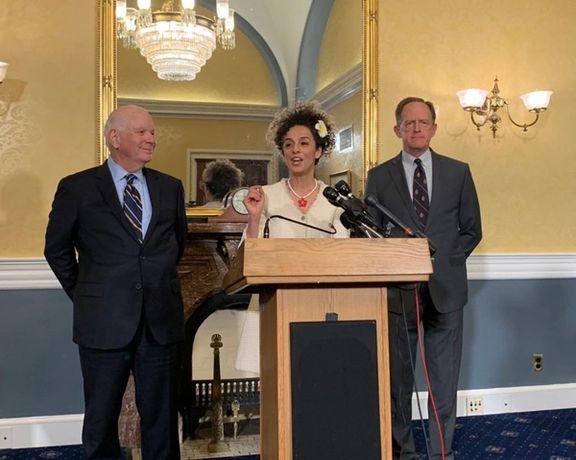
The US Congress has reportedly passed the Masih Alinejad HUNT Act, named after the US-based journalist who was the target of a kidnapping plot by Tehran last year.
“It’s official: Congress has passed the Masih Alinejad HUNT Act, imposing mandatory sanctions on Iranian officials responsible for ongoing suppression of basic human rights in Iran and identifying any foreign banks transacting with those sanctioned individuals,” Twitter account of Senate Banking Committee Republicans said on Saturday.
Its Ranking member is Pennsylvania’s Republican Senator Pat Toomey, who cosponsored the act with Maryland Democrat Senator Ben Cardin. The Masih Alinejad Harassment and Unlawful Targeting Act of 2021 or the Masih Alinejad HUNT Act of 2021 was introduced in the Senate in December 2021 after the New York-based journalist was the target of an Iranian plot to kidnap her and take her to Iran via Venezuela, according to US law enforcement. On July, a man armed with a loaded AK-47 was arrested outside the Brooklyn home of the Iranian dissident and women’s rights activist. A federal complaint said the man named Khalid Mehdiyev, 23, was found with the assault rifle, multiple high-capacity magazines and additional rounds of ammunition and a suitcase full of cash as well as two other different license plates when he was arrested after lurking in the area for two days.
This bill imposes sanctions on foreign persons (i.e., individuals or entities) that are acting on behalf of Iran's government and involved in the harassment of certain individuals, such as human rights activists.
The news about the adoption of the bill was announced on Christmas eve, December 24 when the US Congress is in recess. It is not clear when it was approved, unless if it was part of the omnibus budget bill that was passed right before the holidays.
The bill requires the Department of State to periodically report to Congress on the identities of foreign persons acting on behalf of the Islamic Republic regime that are knowingly responsible for or complicit in the surveillance, harassment, imprisonment, or killing of citizens of Iran or the United States. These can be individuals “who seek to expose corruption or illegal activity by Iranian government officials; obtain, defend, or promote internationally recognized human rights; or obtain, defend, or promote the rights and well-being of women, religious and ethnic minorities, and the LGBTQ community in Iran.”
The report must include foreign persons involved in such actions that occur inside or outside Iran, and then the US president must impose property-blocking sanctions on such person, as well as visa-blocking sanctions on the identified individuals.
The Department of the Treasury must also submit to Congress a report identifying any foreign financial institution that knowingly conducts a significant transaction with a person sanctioned under this bill. The Treasury may prohibit the opening or impose strict conditions on the maintaining of a US correspondent account by such a financial institution.
Dozens of Iranian journalists in other countries, including those working for BBC Persian TV and London-based Iran International TV, repeatedly complain about their own and their family members' harassment in Iran, and say they have been threatened by authorities about possible actions.
Iran executed in December 2020 Rouhollah Zam, editor of a social-media channel, after he was kidnapped in Iraq and convicted on security charges and televised confessions, without due process of law.
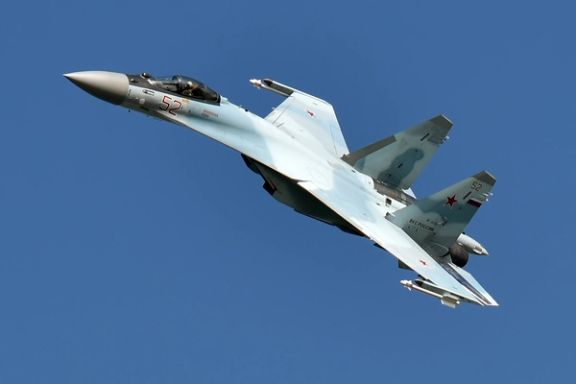
Russia is reportedly preparing to provide the Islamic Republic with Sukhoi Su-35 fighter jets in the near future, Israeli media have reported.
Israel’s Channel 12 quoted some Western intelligence officials on Saturday that as many as 24 jets that were originally intended for Egypt, but thwarted by the US, could be delivered to Tehran.
The Times of Israel says the report also indicated that Iranian pilots have already been trained to use the jets.
Washington has been recently warning that Tehran and Moscow have extensively developed their military relations, as Iran has supplied kamikaze drones that Russia has used against Ukraine.
Both countries are hit by harsh sanctions — the Islamic Republic over its nuclear program and Russia for its war on Ukraine.
A top Ukrainian official called Saturday for the "liquidation" of Iranian factories making drones and missiles, as well as the arrest of their suppliers.
Writing on Twitter on Saturday, Ukrainian presidential aide Mykhailo Podolyak said Iran "blatantly humiliates the institution of international sanctions", before calling for the destruction of Iranian weapon factories in response.
Kyiv has accused Tehran of supplying 1,700 Shahed-136 loitering drones to Moscow. Iran has acknowledged drone deliveries but insists this was not for war in Ukraine.
Western governments have also voiced concern over possible Iranian plans to supply missiles and more weapons to Russia, as the United States and its allies have been sending weapons to Ukraine to turn the tide of the war and not allow Russia to capture more Ukrainian territory.
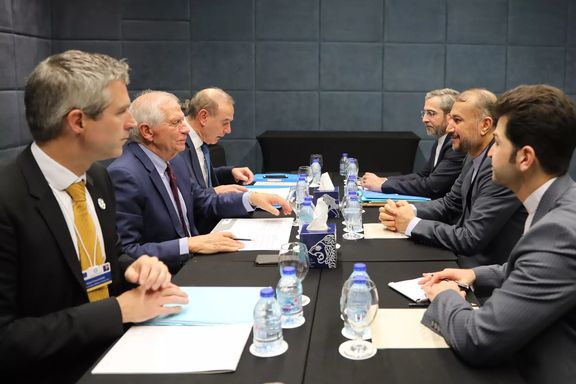
Debates on Iran's unsuccessful foreign policy and the Raisi administration's obvious weakness in this area have come into the spotlight in Iranian media.
The debate began following Foreign Minister Hossein Amir Abdollahian and chief nuclear negotiator Ali Bagheri's reportedly unsuccessful meeting with EU foreign policy chief Josep Borrell in Amman.
Iranian academic Pirouz Mojtahedzadeh said in an interview with Didban Iranwebsite that "Iran's foreign policy is bankrupt." He charged that Iran's diplomats are not well experienced and well trained, adding that Tehran's foreign policy is ideological. He also charged that IRGC generals are the wrong people in the foreign relations arena.
Elsewhere in the interview Mojtahedzadeh argued that the foreign ministry should have a technical rather than ideological approach to foreign policy, adding that Iran needs skilled diplomats who can at least speak English. He said Iranian diplomats should confront their international counterparts, even US diplomats based on the country's national interests rather than any ideology.
Meanwhile, criticizing Tehran's foreign policy priorities which is evident from its attempts to get closer to Moscow and Beijing. He lashed out at China for "its double-standards in the region" and said "Russia will also let us down."

Career diplomats such as Ahmad Azizi have also expressed disappointment over the performance of the foreign minister and his team. Azizi, a former deputy foreign minister, ambassador to Germany and the broker of the deal with the United States over releasing US diplomats who were taken hostage in Iran following the 1979 seizure of the US embassy in Tehran, wrote in a letter to Kamal Kharrazi, the head of Khamenei's Foreign Relations Council that "The foreign minister cannot do anything. Please think of a solution yourself."
Azizi said in the letter that "the chronic and painful crisis of sanctions needs an urgent solution." Meanwhile, he stressed: "The problem is that we have never thought of any problem as a crisis!" He reiterated that solving many of Iran's problems,” including the current economic pressure on the people, “depend on tackling the crisis of sanctions."
According to the letter, published as an op-ed in the reformist daily Etemad, "The routes to decision making in Iran are closed in the Iranian political system which is facing a catalogue of crises. "
As a result of these crises, Iranians' shopping baskets have become increasingly smaller while there is no solution in sight for the problems of industries and entrepreneurship including rising unemployment figures and the government's indecision about the future of the young generation.
The biggest hurdle is opposition by Iran's hardliners to reviving the 2015 nuclear deal based on their ideological, anti-US stance. On Thursday, Hossein Shariatmadari the editor of Khamenei-funded ultraconservative Kayhan newspaper lashed out at Iranian negotiators and diplomats for expressing readiness for a deal with the West during the meeting in Amman.
He wrote: "Why did you say you were ready for negotiations over the JCPOA while Europe and the United States are insisting on their support for Iranian rioters [protesters]?" Other Iranian media including Didban have said that Shariatmadari's opposition to renewed negotiations reveals that a key part of the Iranian government opposes the revival of the talks.
Shariatmadari's connection to Khamenei, once again point fingers at the Supreme Leader as the main obstacle to a deal that could save ordinary Iranians from a long-standing financial misery.